主动表被动的13种情况
动词不定式主动表被动的情况
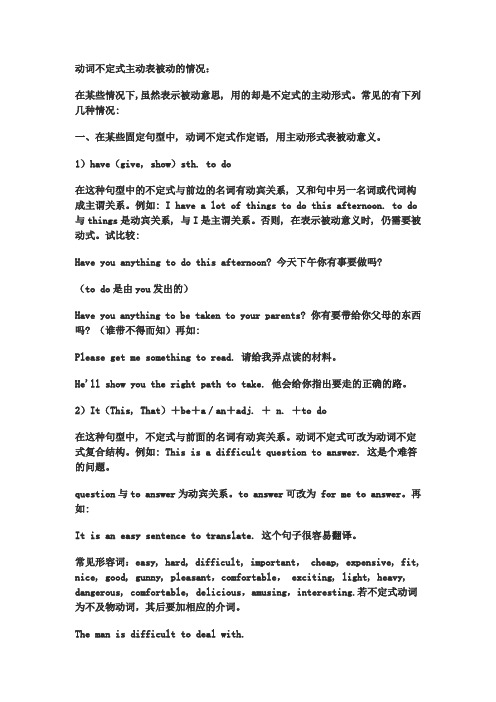
动词不定式主动表被动的情况:在某些情况下,虽然表示被动意思, 用的却是不定式的主动形式。
常见的有下列几种情况:一、在某些固定句型中, 动词不定式作定语, 用主动形式表被动意义。
1)have(give, show)sth. to do在这种句型中的不定式与前边的名词有动宾关系, 又和句中另一名词或代词构成主谓关系。
例如: I have a lot of things to do this afternoon. to do 与things是动宾关系, 与I是主谓关系。
否则, 在表示被动意义时, 仍需要被动式。
试比较:Have you anything to do this afternoon? 今天下午你有事要做吗?(to do是由you发出的)Have you anything to be taken to your parents? 你有要带给你父母的东西吗? (谁带不得而知)再如:Please get me something to read. 请给我弄点读的材料。
He'll show you the right path to take. 他会给你指出要走的正确的路。
2)It(This, That)+be+a/an+adj. + n. +to do在这种句型中, 不定式与前面的名词有动宾关系。
动词不定式可改为动词不定式复合结构。
例如: This is a difficult question to answer. 这是个难答的问题。
question与to answer为动宾关系。
to answer可改为 for me to answer。
再如:It is an easy sentence to translate. 这个句子很容易翻译。
常见形容词:easy, hard, difficult, important, cheap, expensive, fit, nice, good, gunny, pleasant,comfortable, exciting, light, heavy, dangerous, comfortable, delicious,amusing,interesting.若不定式动词为不及物动词,其后要加相应的介词。
英语中主动表被动的用法

一、谓语动词的被动情况:1. 某些连系动词,如look, sound, smell, taste, prove, feel等,由于没有宾语,也就没有被动式,习惯以主动语态形式表示被动意义。
例如:Your reason sounds reasonable. 你的理由听起来很合理。
The flower smells sweet. 这花闻起来香。
Good medicine tastes bitter. 良药苦口。
The silk feels soft. 丝绸摸起来很软。
但是,当上述动词不用作系动词,作实意动词时,则不具有这种用法。
例如: His heart was felt still beating. 他的心脏仍在跳动。
Pepper can be tasted in the soup. 汤里有胡椒粉的味道。
2. 一些动词read, wash, clean, cook, lock, shut, open, act, write,cut,wear、want、need、等,用作不及物动词时且表示主语的某种属性时,用主动表被动。
例如:The door won’t open.这门打不开。
It can’t move.它不能动。
【注意】该用法的不及物动词通常与can’t(不能), won’t(不会)等连用,注意它与用被动语态含义不同:The window won’t shut. 这窗户关不上。
(说明主语的属性——窗户有问题了) The window won’t be shut. 这窗户将不用关上。
(窗户本身没问题,只是不用关)3、 need,want,require(要求,需要),deserve(应得,值得),cannot bear (经不住)后面接doing主动表被动。
The old building requires repairing.这座古建筑需要修了。
These young seedlings will require/need looking after carefully.(=need to be looked after)这些幼苗将需要小心的照管。
主动表被动12种情况

主动表被动12种情况⼀.谓语动词⽤主动表被动1. ⼀些连系动词(eg.look,sound,smell,feel,taste,prove) 要⽤主动形式表被动含义。
The table feels cold. My advice proved to be wrong.2.当open,close, shut ,lock, move 等⽤作不及物动词且与can't,won't等连⽤表⽰主语属性,常⽤主动表被动。
eg.The door won't open.3.当read,wash,clean, cook,cut,wear, carry, record等⽤作不及物动词且与副词well ,easily ,slowly,quickly 连⽤表⽰主语属性. The book sells well. The food doesn't cut easily.4.某些表⽰开始和结束的动词(eg.begin,start,finish,end)主语为事物且不强调动作执⾏者。
When does the concert begin?The play ended at ten o'clock.5.不及物动词及短语⽤主动表被动含义(eg.take place,happen,come about,break out,appear,disappear,last,arise,belong to) The war lasted 3 years.6.表⽰静态动词(have,lack,fit,hold,suit)The hall holds 100 people.The shoes don't fit me.⼆.⾮谓语动词主动表被动1.不定式to blame, to let⽤作表语,⽤主动表被动。
Who is to blame?The house is to let.2.主语+be +adj +to do(不定式作状语且与主语构成逻辑上动宾关系)The text is easy to understand.3.不定时作定语和所修饰的词构成动宾关系,且有句⼦主语来完成。
主动表被动的13种情况
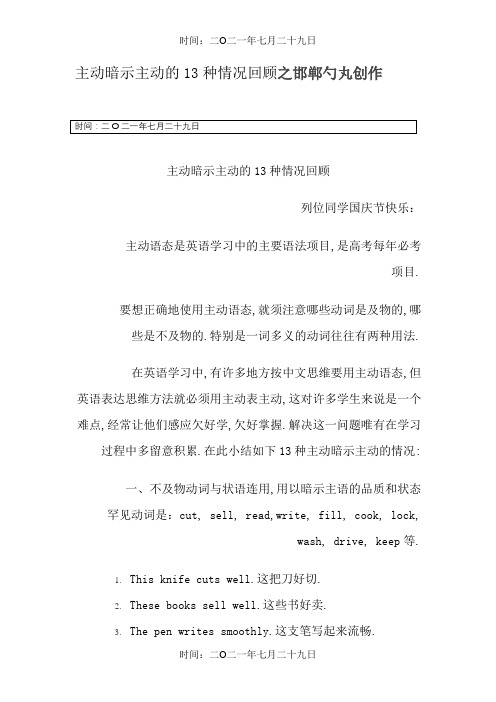
主动暗示主动的13种情况回顾之邯郸勺丸创作主动暗示主动的13种情况回顾列位同学国庆节快乐:主动语态是英语学习中的主要语法项目,是高考每年必考项目.要想正确地使用主动语态,就须注意哪些动词是及物的,哪些是不及物的.特别是一词多义的动词往往有两种用法.在英语学习中,有许多地方按中文思维要用主动语态,但英语表达思维方法就必须用主动表主动,这对许多学生来说是一个难点,经常让他们感应欠好学,欠好掌握.解决这一问题唯有在学习过程中多留意积累.在此小结如下13种主动暗示主动的情况:一、不及物动词与状语连用,用以暗示主语的品质和状态罕见动词是:cut, sell, read,write, fill, cook, lock,wash, drive, keep等.1.This knife cuts well.这把刀好切.2.These books sell well.这些书好卖.3.The pen writes smoothly.这支笔写起来流畅.4.Meat won’t keep long in such hot weather.肉在这样热的天气里放不长久.5.The cloth washes well.这种布好洗.二、一些连系动词的主动式+形容词.罕见动look,smell,taste,sound,feel,prove,turn out等.1.The apples taste good.2.The flower smells wonderful.3.The news proved/turned out true.4.Cotton feels soft.三、不定式在某些形容词之后,且与主语有动宾关系.不定式修饰作表语和宾语补足语的形容词时,结构:主语+系动词+形容词 + 不定式;动词+宾语+形容词+不定式.如果形容词是暗示难易、利弊等含义:用于此结构的罕见形容词有:hard,defficult,easy,heavy,fit,good,comfortable,conven ient,impossible,convenient, cheap, expensive,(便当的,便利的), 等.1.The problem is easy to do.2.The question is difficult to answer.3.The box is heavy to carry.4.The project is impossible to complete in a year.5.The questionis difficult to answer.这个问题很难回答.6.The work is easy to do.这项任务很好做.7.I found the car comfortable to ride in.我觉得这种车很好坐.8.They think it difficult to finish the work insuch bad weather.他们认为在这样卑劣的天气里很难完成这项任务.9.That makes poetry difficult to write.那就使得诗很难写.10.She was as easy to please as her father. 她如她妈妈一样容易取悦.四、Need, want, require(要求,需要), deserve(应得,值得), be worth值得),not bear(经不住) 后面接doing主动表主动.1.The book is worth reading.这本书值得一读.2.The old building requires repairing.这座古建筑需要修了.3.These young seedlings will require/need lookingafter (=need to be looked after) carefully.这些幼苗将需要小心的照管.4.Your hair wants/needs cutting (needs to becut).你的头发该剪了.五、不定式作定语,放在被修饰词后面,与前面被修饰的名词或代词有动宾关系,又在句子中与另一名词或代词有主谓关系,不定式要用主动表主动含义.五、不定式作定语,放在被修饰词后面,与前面被修饰的名词或代词有动宾关系,又在句子中与另一名词或代词有主谓关系,不定式要用主动表主动含义.1.I have much work to do.我有许多要做的事情.(与work有动宾关系,与I有主谓关系)2.Tom is looking for a room to live in. Tom在找一间住的房间.(与room有动宾关系,与Tom 有主谓关系)3.He has a family to support.他要维持一个家庭.(与family有动宾关系,与he有主谓关系)六、在be to结构中的一些不定式:这种结构中的不定式通常应用主动表主动.下列动词用不定式的主动形式暗示主动意义:1.Who is to blame for starting the fire?这场火灾应由谁担任?2.You are to blame for the accident.你应为这事受动责备.3.The house is to let.此房出租.4. A lot remains to do.还剩下许多事情要做.七、系动词没有主动形式,但有些系动词常暗示主动意义.罕见的有taste(吃起来), sound (听起来), prove(证明是), feel(摸上去感应), look(看起来),smell(闻起来)等, appear, be become, fall, feel, get, grow, keep, look, remain, seem, smell, sound, stay, taste, turn例如:1.Your reason sounds reasonable.你的理由听起来很合理.2.Good medicine tastes bitter to the mouth.良药苦口.八、一些与can''t(不克不及)或won''t(不会)连用的动词.经常使用的有: lock(锁住), shut(打开) , open(打开), act(上演), write(写),cut(砍,切),wear(穿,戴)等,用作不及物动词时,用主动表主动.例如:1.The door won''t open.这门打不开.2.It can''t move.它不克不及动.九、一些动词如sell(销售) , wash(洗), clean(打扫), burn(燃烧), cook(煮)等与副词如well(好), easily(容易地), perfectly(十分地)等连用 ,描会事物的特性,用主动表主动,结构是主语+动词+加副词.例如:1.The book sells well.这种书很滞销.2.These clothes wash easily.这些衣服很易洗.3.The pen writes well.这笔很好写.十、主语much, a great deal, little, what等,其表语如是不定式,则用不定式的主动表主动.1.What is to do?做什么?2.Much is to do.太多要做的事.十一、在“there be”句型中作主语的定语如果是现在分词时,所用的现在分词要用主动表主动意义.1.There is nothing doing these days.这些天没事干.2.I see there’s a good idea planning. 我知道又在打好主意.十二、不克不及用于主动语态的及物动词或动词短语:fit, have, marry, own, wish, cost, notice, watch, agree with, arrive at / in, shake hands with, succeed in, suffer from, happen to, take part in, walk into, belong to十三、不及物动词或动词短语无主动语态:appear, die disappear, end (vi. 结束), fail, happen, last, lie, remain, sit, spread, stand,break out, come true, fall asleep, keep silence, lose heart, take place.The fact remains to be proved.事实尚待证明比较: rise, fall, happen是不及物动词;raise, seat是及物动词.(错) The price has been risen.(对) The price has risen.(错) The accident was happened last week.(对) The accident happened last week.(错) The price has raised.(对) The price has been raised.(错) Please seat. (对) Please be seated.。
英语主动表被动用法归纳

英语主动表被动用法归纳
英语中的被动语态是表达动作的接收者的一种语法结构,而不是动作的执行者。
然而,有时我们也会使用主动语态来表示被动意义,这就是主动表被动用法。
以下是一些常见的主动表被动用法的归纳:
1. "动词+ oneself" 结构:这种结构表示主语自己对自己进行某个动作,有自我参考的意味。
例如:He hurt himself while playing soccer.
2. "动词+ each other" 结构:这种结构表示两个或多个主语互相进行某个动作。
例如:They helped each other with their homework.
3. "动词+ something" 结构:这种结构表示主语对某个物体进行某个动作。
例如:She painted the wall white.
4. "be + 动词过去分词" 结构:这种结构表示主语的状态或特征。
例如:The window was broken by the ball.
5. "get + 动词过去分词" 结构:这种结构表示主语经历了某种变化或受到某种影响。
例如:She got lost in the city.
6. "become + 动词过去分词" 结构:这种结构表示主语变成了某种状态或特征。
例如:The water became ice.
以上是一些常见的主动表被动用法。
1。
英语中主动形式表被动的情况
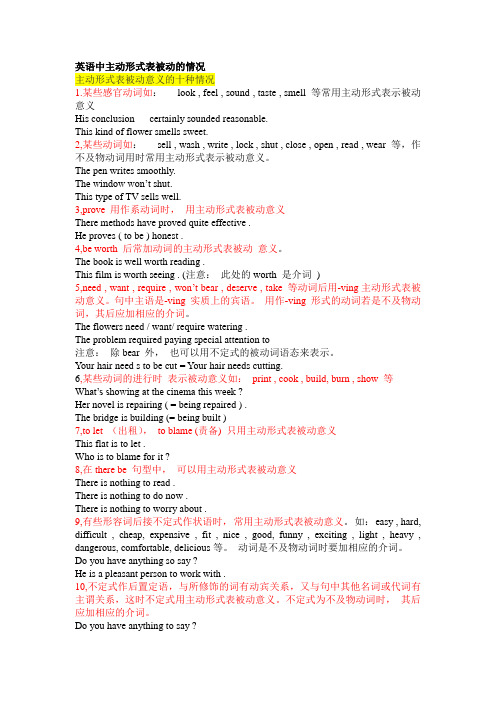
英语中主动形式表被动的情况主动形式表被动意义的十种情况1.某些感官动词如:look , feel , sound , taste , smell 等常用主动形式表示被动意义His conclusion certainly sounded reasonable.This kind of flower smells sweet.2,某些动词如:sell , wash , write , lock , shut , close , open , read , wear 等,作不及物动词用时常用主动形式表示被动意义。
The pen writes smoothly.The window won’t shut.This type of TV sells well.3,prove 用作系动词时,用主动形式表被动意义There methods have proved quite effective .He proves ( to be ) honest .4,be worth 后常加动词的主动形式表被动意义。
The book is well worth reading .This film is worth seeing . (注意:此处的worth 是介词)5,need , want , require , won’t bear , deserve , take 等动词后用-ving主动形式表被动意义。
句中主语是-ving 实质上的宾语。
用作-ving 形式的动词若是不及物动词,其后应加相应的介词。
The flowers need / want/ require watering .The problem required paying special attention to注意:除bear 外,也可以用不定式的被动词语态来表示。
Your hair need s to be cut = Your hair needs cutting.6,某些动词的进行时表示被动意义如:print , cook , build, burn , show 等What’s showing at the cinema this week ?Her novel is repairing ( = being repaired ) .The bridge is building (= being built )7,to let (出租),to blame (责备) 只用主动形式表被动意义This flat is to let .Who is to blame for it ?8,在there be 句型中,可以用主动形式表被动意义There is nothing to read .There is nothing to do now .There is nothing to worry about .9,有些形容词后接不定式作状语时,常用主动形式表被动意义。
英语中主动表被动的用法
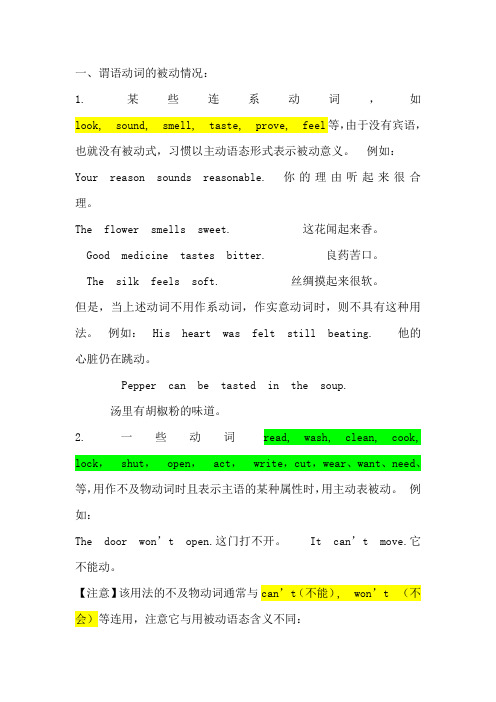
一、谓语动词的被动情况:1. 某些连系动词,如look, sound, smell, taste, prove, feel等,由于没有宾语,也就没有被动式,习惯以主动语态形式表示被动意义。
例如:Your reason sounds reasonable. 你的理由听起来很合理。
The flower smells sweet. 这花闻起来香。
Good medicine tastes bitter. 良药苦口。
The silk feels soft. 丝绸摸起来很软。
但是,当上述动词不用作系动词,作实意动词时,则不具有这种用法。
例如:His heart was felt still beating. 他的心脏仍在跳动。
Pepper can be tasted in the soup.汤里有胡椒粉的味道。
2. 一些动词read, wash, clean, cook, lock,shut,open,act,write,cut,wear、want、need、等,用作不及物动词时且表示主语的某种属性时,用主动表被动。
例如:The door won’t open.这门打不开。
It can’t move.它不能动。
【注意】该用法的不及物动词通常与can’t(不能), won’t(不会)等连用,注意它与用被动语态含义不同:The window won’t shut. 这窗户关不上。
(说明主语的属性——窗户有问题了) The window won’t be shut. 这窗户将不用关上。
(窗户本身没问题,只是不用关)3、need,want,require(要求,需要),deserve(应得,值得),cannot bear(经不住)后面接doing主动表被动。
The old building requires repairing.这座古建筑需要修了。
These young seedlings will require/need looking after carefully.(=need to be looked after)这些幼苗将需要小心的照管。
(完整版)主动表被动的13种情况
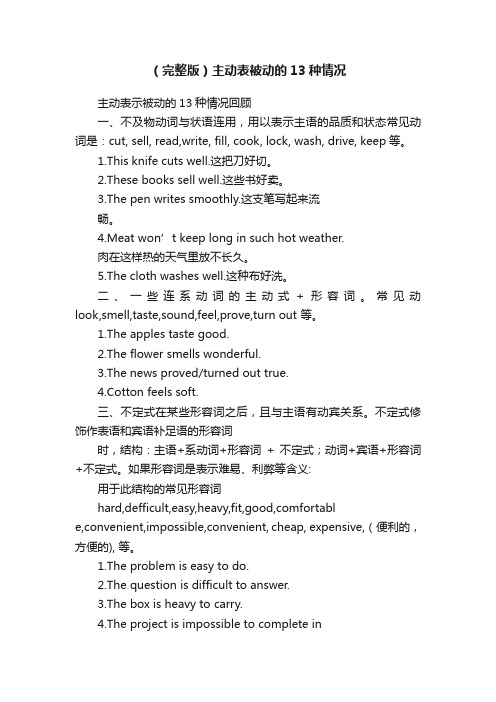
(完整版)主动表被动的13种情况主动表示被动的13种情况回顾一、不及物动词与状语连用,用以表示主语的品质和状态常见动词是:cut, sell, read,write, fill, cook, lock, wash, drive, keep等。
1.This knife cuts well.这把刀好切。
2.These books sell well.这些书好卖。
3.The pen writes smoothly.这支笔写起来流畅。
4.Meat won’t keep long in such hot weather.肉在这样热的天气里放不长久。
5.The cloth washes well.这种布好洗。
二、一些连系动词的主动式+形容词。
常见动look,smell,taste,sound,feel,prove,turn out 等。
1.The apples taste good.2.The flower smells wonderful.3.The news proved/turned out true.4.Cotton feels soft.三、不定式在某些形容词之后,且与主语有动宾关系。
不定式修饰作表语和宾语补足语的形容词时,结构:主语+系动词+形容词+ 不定式;动词+宾语+形容词+不定式。
如果形容词是表示难易、利弊等含义:用于此结构的常见形容词hard,defficult,easy,heavy,fit,good,comfortable,convenient,impossible,convenient, cheap, expensive,(便利的,方便的), 等。
1.The problem is easy to do.2.The question is difficult to answer.3.The box is heavy to carry.4.The project is impossible to complete ina year.5.The question is difficult to answer.这个问题很难回答。
- 1、下载文档前请自行甄别文档内容的完整性,平台不提供额外的编辑、内容补充、找答案等附加服务。
- 2、"仅部分预览"的文档,不可在线预览部分如存在完整性等问题,可反馈申请退款(可完整预览的文档不适用该条件!)。
- 3、如文档侵犯您的权益,请联系客服反馈,我们会尽快为您处理(人工客服工作时间:9:00-18:30)。
主动表示被动的13种情况回顾主动表示被动的13种情况回顾各位同学国庆节快乐:被动语态是英语学习中的主要语法项目,是高考每年必考项目。
要想正确地使用被动语态,就须注意哪些动词是及物的,哪些是不及物的。
特别是一词多义的动词往往有两种用法。
在英语学习中,有许多地方按中文思维要用被动语态,但英语表达思维方式就必须用主动表被动,这对许多学生来说是一个难点,常常让他们感到不好学,不好掌握。
解决这一问题唯有在学习过程中多留意积累。
在此小结如下13种主动表示被动的情况:一、不及物动词与状语连用,用以表示主语的品质和状态常见动词是:cut, sell, read,write, fill, cook, lock, wash, drive, keep等。
1.This knife cuts well.这把刀好切。
2.These books sell well.这些书好卖。
3.The pen writes smoothly.这支笔写起来流畅。
4.Meat won’t keep long in such hot weather.肉在这样热的天气里放不长久。
5.The cloth washes well.这种布好洗。
二、一些连系动词的主动式+形容词。
常见动look,smell,taste,sound,feel,prove,turn out等。
1.The apples taste good.2.The flower smells wonderful.3.The news proved/turned out true.4.Cotton feels soft.三、不定式在某些形容词之后,且与主语有动宾关系。
不定式修饰作表语和宾语补足语的形容词时,结构:主语+系动词+形容词+ 不定式;动词+宾语+形容词+不定式。
如果形容词是表示难易、利弊等含义: 用于此结构的常见形容词有:hard,defficult,easy,heavy,fit,good,comfortable,conve nient,impossible,convenient, cheap, expensive,(便利的,方便的), 等。
1.The problem is easy to do.2.The question is difficult to answer.3.The box is heavy to carry.4.The project is impossible to complete in ayear.5.The question is difficult to answer.这个问题很难回答。
6.The work is easy to do.这项工作很好做。
7.I found the car comfortable to ride in.我觉得这种车很好坐。
8.They think it difficult to finish the work insuch bad weather.他们认为在这样恶劣的天气里很难完成这项工作。
9.That makes poetry difficult to write.那就使得诗很难写。
10.She was as easy to please as her father. 她如她妈妈一样容易取悦。
四、Need, want, require(要求,需要), deserve(应得,值得), be worth值得),not bear(经不住) 后面接doing主动表被动。
1.The book is worth reading.这本书值得一读。
2.The old building requires repairing.这座古建筑需要修了。
3.These young seedlings will require/needlooking after (=need to be looked after)carefully.这些幼苗将需要小心的照管。
4. Your hair wants/needs cutting (needs to becut).你的头发该剪了。
五、不定式作定语,放在被修饰词后面,与前面被修饰的名词或代词有动宾关系,又在句子中与另一名词或代词有主谓关系,不定式要用主动表被动含义。
五、不定式作定语,放在被修饰词后面,与前面被修饰的名词或代词有动宾关系,又在句子中与另一名词或代词有主谓关系,不定式要用主动表被动含义。
1.I have much work to do.我有许多要做的事情。
(与work有动宾关系,与I有主谓关系)2.Tom is looking for a room to live in. Tom在找一间住的房间。
(与room有动宾关系,与Tom 有主谓关系)3.He has a family to support.他要维持一个家庭。
(与family有动宾关系,与he有主谓关系)六、在be to结构中的一些不定式:这种结构中的不定式通常应用主动表被动。
下列动词用不定式的主动形式表示被动意义:1.Who is to blame for starting the fire?这场火灾应由谁负责?2.You are to blame for the accident.你应为这事受动责备。
3.The house is to let.此房出租。
4.A lot remains to do.还剩下许多事情要做。
七、系动词没有被动形式,但有些系动词常表示被动意义。
常见的有taste(吃起来), sound (听起来), prove(证明是), feel(摸上去感到), look(看起来),smell(闻起来)等, appear, be become, fall, feel, get, grow, keep, look, remain, seem, smell, sound, stay, taste, turn例如:1.Your reason sounds reasonable.你的理由听起来很合理。
2.Good medicine tastes bitter to the mouth.良药苦口。
八、一些与can''t(不能)或won''t(不会)连用的动词。
常用的有: lock(锁住), shut(关上) , open(打开), act(上演), write(写),cut(砍,切),wear(穿,戴)等,用作不及物动词时,用主动表被动。
例如:1.The door won''t open.这门打不开。
2.It can''t move.它不能动。
九、一些动词如sell(销售) , wash(洗), clean(打扫), burn(燃烧), cook(煮)等与副词如well(好), easily(容易地), perfectly(十分地)等连用,描会事物的特性,用主动表被动,结构是主语+动词+加副词。
例如:1.The book sells well.这种书很畅销。
2.These clothes wash easily.这些衣服很易洗。
3.The pen writes well.这笔很好写。
十、主语much, a great deal, little, what等,其表语如是不定式,则用不定式的主动表被动。
1.What is to do?做什么?2.Much is to do.太多要做的事。
十一、在“there be”句型中作主语的定语如果是现在分词时,所用的现在分词要用主动表被动意义。
1.There is nothing doing these days.这些天没事干。
2.I see there’s a good idea planning. 我知道又在打好主意。
十二、不能用于被动语态的及物动词或动词短语:fit, have, marry, own, wish, cost, notice, watch,agree with, arrive at / in, shake hands with, succeed in, suffer from, happen to, take part in, walk into, belong to 十三、不及物动词或动词短语无被动语态:appear, die disappear, end (vi. 结束), fail, happen, last, lie, remain, sit, spread, stand,break out, come true, fall asleep, keep silence, lose heart, take place.The fact remains to be proved.事实尚待证明比较:rise, fall, happen是不及物动词;raise, seat是及物动词。
(错) The price has been risen.(对) The price has risen.(错) The accident was happened last week. (对) The accident happened last week. (错) The price has raised.(对) The price has been raised.(错) Please seat.(对) Please be seated.。
